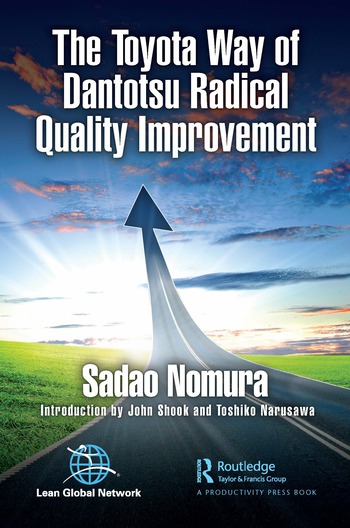The technical components and underlying philosophy of lean, based on the Toyota Production System, work together to create a lean enterprise. But companies embarking on lean transformations often miss that lean change is much more than technical or physical process change, according to Joe Murli, a member of the faculty at the Lean Enterprise Institute, where he teaches Key Concepts of Lean as a classroom workshop and as an online webcast. In the following interview, he explains how lean’s key technical elements and philosophy work together and describes the new online webcast.
LEI: What are the main problems people struggle with when trying to understand and implement lean?
Murli: When you visit a successful lean organization, the artifacts you observe are very simple and straightforward. Many of them may even seem frivolous. But what often gets missed is that the transformation is much more than simply the physical process changes. If you duplicate them, you will see some benefit for sure, but once you’ve achieved these improvements, they will plateau, and you won’t realize further improvement unless another project is undertaken by someone responsible for such things. In fact, the data suggest that in the majority of cases you will experience a degradation over time. You need the ongoing flow of ideas from those doing the work for continual elimination of waste while improving the customer experience.
One big thing people struggle with is understanding that lean is more than just a technical process change– it’s a change in how they think about their business.
Often people hear about how other companies got some really good business impact through lean, and they have the idea that, ‘Well, if I can just get one of my process experts to change this, I can get the same results.’ They don’t fully realize the cultural change that is essential to ensure that the improvements you get don’t go away after a while. You need everybody throughout the organization thinking that way, as opposed to having just a few process experts doing lean.
LEI: What are some leadership mindsets and behaviors that support development of a culture of continuous improvement?
Murli: One is that the customer is front and center, so every day we need to find ways to improve the customer experience with the business. This means understanding what the customer wants. It means knowing what choices the customer has in terms of your competition. And it means finding ways to solve problems to serve the customer a little better each day through the elimination of waste.
Another mindset important to lean is to respect people’s ability. Keep them engaged and constantly asking why. And instead of being in a conference room somewhere, the leaders should be out walking the workplace and asking questions in a specific way that leads to deeper organizational understanding.
LEI: If you are new to lean, how can you get started?
Murli: In the online workshop Key Concepts of Lean, we take a look at how an organization goes about planning for a lean transformation. Overall, this course is designed to give the key concepts of transforming your company into a lean organization. We’ll answer questions such as, ‘How do I get my boss to think this way?’ But mostly we’ll be focused on learning the key concepts of a lean transformation.
LEI: What key concepts of lean do you cover in the online workshop?
Murli: The tools, concepts, and thinking models we present fit under the three headings of Purpose, Process, and People.
LEI: Why are these concepts important?
Murli: Lean is a sort of eco-system where the elements interact in a very specific way. Understanding how to get an organization to think deeply and purposefully about the Purpose-Process-People model as an integrated structure is key to capturing the ‘genie in the bottle’ of unlocking the ideas of the many in an organization.
First, there has to be this pervasive, deep understanding of the purpose of the organization. This has to be disseminated through the entire workforce so they think about it every day, and you see it manifested in the company’s value stream. Next, the processes need to be very focused on increasing speed, improving quality, and eliminating waste. And people are what hold it all together. In the lean organization, the leaders tend to be more focused on coaching the problem solving capabilities of the people rather than being the problem solvers themselves.
LEI: How will students benefit from understanding these basic lean concepts?
Murli: The course goes through all three of these in a sequential format and how they are applied in various businesses. For example, students will learn how people are involved by thinking about how to improve the work on a daily basis. For the process part, students will learn how to come together with their co-workers on a daily basis to reflect– to assess where the daily waste was and how effective the changes they made were in eliminating that waste. They will learn how to make these kinds of small experiments in the organization to improve their processes– and if the changes in the work they made prove to be right– to lock them into their standard work. Then the workshop participants will be given exercises that will help them apply these principles in their own organizations.
LEI: What challenges does the workshop help people deal with?
Murli: We will be spending time both during the workshop and in homework assignments to first understand generic concepts– where they came from, and why they manifest themselves the way they do in a mature lean organization. Then the students will look inwardly to their own organizations to find ways these concepts can be applied in their own companies.
LEI: What is unique about this online workshop, and how is it superior to a DVD that presents these concepts?
Murli: This online workshop creates the accessibility for people to talk with a lean expert and to interact with someone who can help them to understand basic lean concepts. Another advantage is that the assignments are all geared to their own workplace, so they can come back to me and talk to me about what they see in their own organization.
In other words, the online workshop will be interactive, so that students will have the opportunity to correspond with the instructor between sessions to get feedback and help them on their learning journey. You can’t get that from a DVD. The ability to build a relationship with your instructor is an important aspect of the learning process that helps students to internalize the knowledge they receive.
As part of the online workshop, we’ll give students some hypothetical problems to solve. Also, they will be asked to pick a problem at their work to solve and then report back to me via email between sessions on how their solution is working. I’ll provide the feedback and coaching. That kind of interactive homework you can’t receive from a DVD.
Finally, I believe it’s extremely important for anyone early in their lean journey to build their own network of lean experts. Once the students and I have built this linkage of communications, they should be able to contact me and stay in touch to share their lean experiences after the workshop is over.
LEI: If you are new to lean, how can you get started?
Murli: In the workshop, we take a brief look at how an organization goes about planning for a lean transformation. Overall, this course is designed to give the key concepts of transforming your company into a lean organization. We’ll answer questions such as, ‘How do I get my boss to think this way?’ But mostly we’ll be focused on learning the key concepts of a lean transformation.
About Joe Murli
A member of the Lean Enterprise Institute faculty, Joe Murli is CEO of the Murli Group in Mystic, CT, a lean coaching organization focused on integrating the human resource and technology aspects of lean. He conducts LEI’s new live, online workshop Key Concepts of Lean, which also is offered in a classroom setting.





